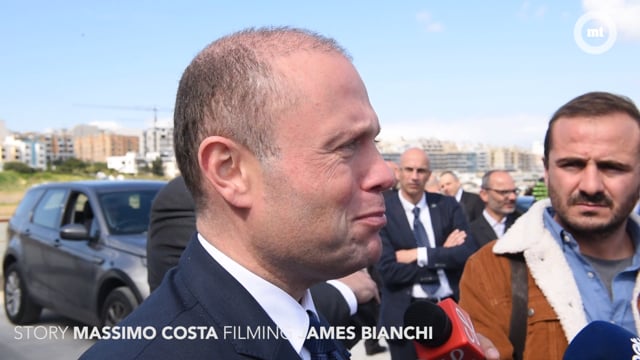[WATCH] Updated | Joseph Muscat hits out at UK parliamentary committee over Cambridge Analytica findings
‘Maltese government's submissions were ignored… No wonder the UK is in such a mess right now,’ Prime Minister says


The Prime Minister has reiterated that he has never had any form of contact with SCL, the company behind Cambridge Analytica, as he slammed the UK parliament for ignoring the Maltese government’s submission on the case.
Asked whether he still maintained never having met anyone behind SCL before the 2013 general election, Joseph Muscat, who was fielding comments from journalist after a special cabinet meeting at Salina Nature Reserve, said that he “totally” stood by his position.
Reports in Times of Malta today claimed that, according to leaked emails seen by the newspaper, SCL had offered to broker a meeting between Muscat, then Opposition leader, and Christian Kalin, CEO of passport-selling firm Henley & Partners.
The interim report by the House of Commons' Digital, Culture, Media and Sport Committee had previously stated that the committee had evidence to show Kalin was meeting representatives from both the Nationalist and Labour parties prior to the 2013 election and that the company had been advising the Labour Party for years before that.
Despite the government rejecting the claims and calling on the committee to “rectify” the “serious error”, the final report has retained the reference to Malta, citing “confidential documents shown to the committee”.
Reacting to this, Muscat noted that the initial allegations had claimed that Henley & Partners had introduced him to SCL, but that this had then been flipped around.
READ ALSO: UK parliament committee keeps Labour Party reference in disinformation report
“The first allegations have been turned upside down, because they first claimed that Henley introduced us to SCL, and are now saying the opposite: that SCL had been the one to bring us to Henley,” he said, "None of these are true."
He also lamented the fact that the UK parliament committee had retained in the report’s final version the Malta reference, despite the Maltese government having made a formal submission in this regard.
“I am very disappointed that, after we made a formal submission to the British Parliament, its select committee decided to ignore our such submission,” he said, “[In its report], the committee based itself on information which it said it has, and I’d like to see for myself what this information consists in”.
“If this is the way they operate, it’s no wonder that the UK is in such a mess right now,” Muscat went on to quip.
Muscat’s denial can’t erase the proof - PN
In a statement Tuesday afternoon, the Nationalist Party said that the UK parliament’s report re-confirmed that the sale of Maltese citizenship had been a done deal decided upon by the Labour Party and by Muscat before they were elected to government.
The report “clearly and unequivocally” showed that SCL had definitely held meetings in Malta, and that Christian Kali from Henley & Partners had met with Muscat in 2011, and with the PL before the 2013 election, through SCL’s efforts.
“SCL Group is the company which set up Cambridge Analytics and which was, and still is, involved in an international scandal regarding the manipulation of voters in a number of elections worldwide,” the party said.
The British parliament had said that its information was verified by a House of Commons committee, which drew up a report based on evidence which it was shown in confidence, the PN underlined.
“No denial by the Labour Party, by Joseph Muscat, or by the government can erase the proof which the UK parliament examined.”
“The PL and Muscat’s behaviour indicates that there has been undue influence prior to the 2013 election, and that such influence led to the government starting to sell Maltese citizenship after being elected,” the party added.

.png)




















